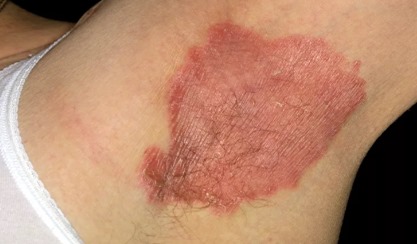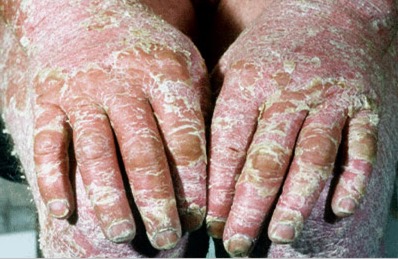Alsys emphasises a holistic approach that combines medical treatment and advocacy. Aloys's psoriasis products can significantly improve the quality of life for those living with psoriasis and work towards a future where the burdens of this chronic condition are minimized. Through continued efforts in research, and a thorough understanding of the disease etiology, we intend to make a difference in the lives of patients suffering with psoriasis.
Facing Reality with Alsys: Embracing Solutions Beyond Denial
Investing in Skin Science represents a commitment to advancing the understanding and treatment of psoriasis, a chronic autoimmune condition that significantly impacts the lives of millions. The belief that freedom is for all underlines the importance of developing effective treatments to alleviate the physical and psychological burdens of psoriasis, moving toward a future where the disease is not only manageable but potentially curable.
Current treatments only reduce symptoms, not cure. The mechanisms involved in the initiation and development of the disease, the role of oxidative stress in this autoimmune disease, as well as potential therapeutic options with substances of natural origin. Phytochemicals that can represent potential remedies in the fight against psoriasis. The relationship between chosen natural substances and immune system response is vital for the cure of psoriasis. The efficacy of potential natural-derived drugs in controlling symptoms and their ability to maintain long-term disease inactivity without side effects, and the result of our work, which highlights the effectiveness of plant-derived drugs in controlling the inflammatory burden on psoriatic patients by decreasing the oxidative stress conditions.

Curious
Natural products with complex structures offer a promising avenue for the management of psoriasis. These products often have multiple mechanisms of action, providing anti-inflammatory, antioxidant, and immunomodulatory effects that can help alleviate the symptoms of psoriasis. While further research is needed to fully understand their efficacy and safety, these natural remedies could complement conventional treatments and provide additional relief to psoriasis patients.
Tenacious
During the chemical screening of secondary metabolites of the plants for their therapeutic activity over inflammatory skin disorders, the team eventually found an extract having most idealistic combination for the treatment of psoriatic lesions. This extract was blended with other bioactives which were showing similar activity for synergistic and adjunct effects like humectant, cracked skin healing and pain conditions associated with psoriasis. Thus in 2018 the team established a therapeutic formulae which had a great potential to become a FIRST LINE TREATMENT for psoriasis.


Undeterred
The research team commenced phyto chemical screening of various plant material extracts ( identified in Germany) for antibacterial, anti psoriasis, and antieczema activities. Over these 14 years the team successfully isolated many bio active compounds showing promising action against inflammatory diseases & pathogenic bacteria. The team identified potential therapeutic precursors, furanocoumarins and coumarins, which were studied for their diverse structures and variety of biological activities, specifically anti-inflammatory and anti psoriatic activities. Year 2020 onwards: One completion of THE DISCOVERY the founders have under the firm Älsys Research” undertaken studies such as Chemistry, invitro, Invivo, CT along with medical writing, filing of patents, Formulation of the compound for commercial applications, etc
Plaque type psoriasis
The first, the most common is plaque type psoriasis. Initiation of the spread of the disease occurs in approximately 80- 90% of patients. Its clinical signs are elevated bright red elements with well-defined boundaries which are covered with a thick white silvery plaque dead skin cell. Plaques can spread all over the skin, but the foci are located mainly on the scalp, elbows, and knees, lower back on the extensors. Painful and itchy scales form on plaque areas, when scales are removed, the surface of the plaque can bleed and the scales can burst. In this case, the patient is constantly in remission and exacerbations. These are the most severe and acute in stressful situations, due to skin injuries, etc. In the initial stages, they are treated with external agents, as the disease develops in systemic form. The cure is not possible
1. Guttate psoriasis
The second type is guttate psoriasis. They are located on the trunk, sometimes the scalp, arms, legs. They number to a hundred or more, sometimes 0.5 – 1 cm in diameter. Subsequently, apparent areas of normal skin Guttate psoriasis can similarly be a once-off episode that resolves on its own, especially with appropriate antibiotic therapy of the causative streptococcus infection, or it can herald a lifelong vulnerability to psoriasis. Guttate psoriasis may also evolve into plaque psoriasis or become a persistent recurrent disorder. Light therapy and topical treatment are typical interventions.


Inverse Psoriasis
Inverse Psoriasis affects between 3 and 7% of all psoriasis sufferers, especially in obese people and skin folds. It presents as smooth, glossy, red lesions in the folds of the skin, such as under the breasts, in the armpits, and under the groin and buttocks
The absence of scales, which are a characteristic of most other forms of psoriasis, is the result of the moist circumstances of the skin areas where outbreaks happen. The rash is irritating and painful due to friction and sweat and is challenging to handle. Steroids, antifungals, and anti-inflammatory topical applications can alleviate the pain associated with inverse psoriasis and reduce the risk of contamination
Pustular Psoriasis
Pustular psoriasis with white pustules surrounded by red skin is an uncommon and serious psoriasis type. It might be an overgeneralized state affecting a large proportion of a person’s body, but it might present itself locally, including the hands and toes. Pustular psoriasis blisters do not include infectious pus and white blood. Withdrawal from systemic steroids, infection, anxiety, and contact with chemicals might all trigger Pustular psoriasis. Systemic medication, such as biologics and oral retinoids, to reduce inflammation and maintain the disease’s systemic consequences are essential to watch over sufferers.


Erythrodermic psoriasis
Erythrodermic psoriasis is the least common variant of the disease but is very severe, and its hallmark is extensive, fiery redness and exfoliation of the skin surface on most of the body, if not all. This form of psoriasis can be triggered by the sudden discontinuation of systemic psoriasis treatment, severe sunburn, or the exacerbation of another type of psoriasis.Erythrodermic psoriasis is associated with life-threatening complications including severe illness due to protein and fluid loss, infections, pneumonia, and a spillover of heart failure. Erythrodermic psoriasis is fatal and requires immediate medical attention[34]. The approach to treatment usually includes hospitalization for optimal hydration and management of body temperature in addition to systemic therapy.
